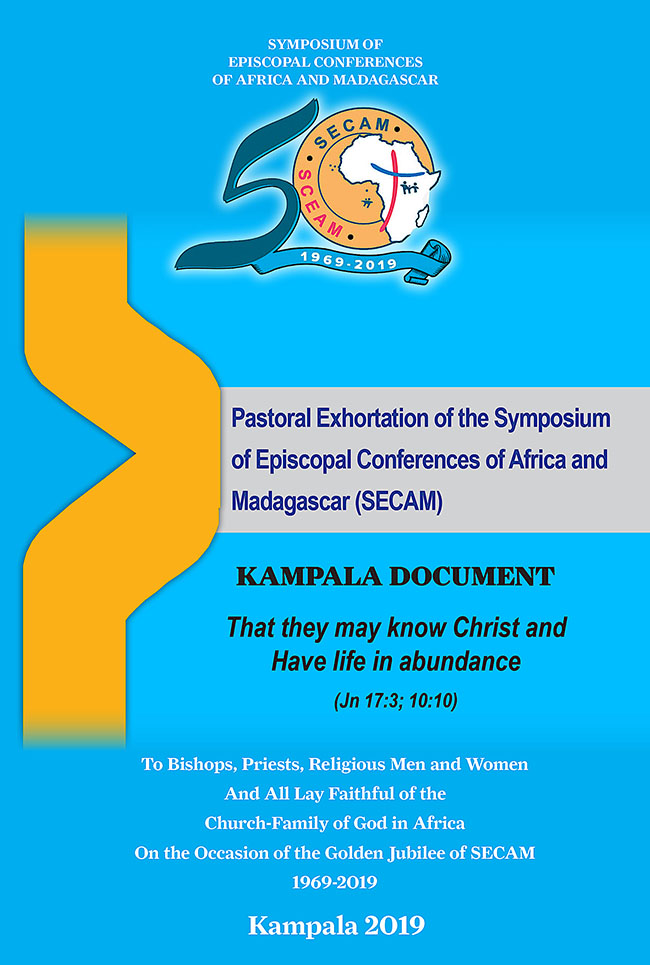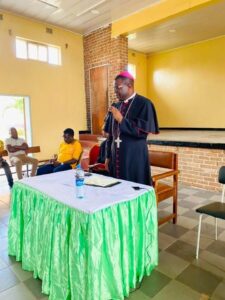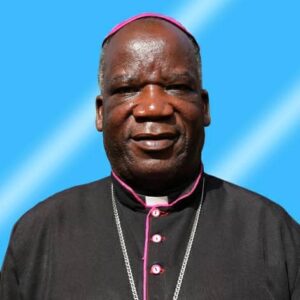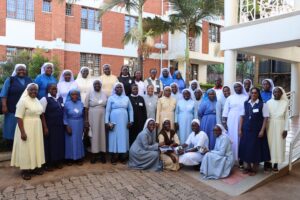SECAM’s ‘Kampala Document’ Launched Highlighting Call for Renewed Commitment, New Mentalities, New Pastoral Strategies

Andrew Kaufa smm
The Symposium of Episcopal Conferences of Africa and Madagascar (SECAM) has on January 28, 2020 launched the Kampala Document which captures the experiences of the bishops of the Church in Africa during the 18th SECAM plenary which coincided with the celebration of the organization’s 50th anniversary.
The first Vice President of SECAM and bishop of Umtata Diocese, Rt. Rev. Sithembele Anton Sipuka made the presentation of the document from Pretoria, South Africa, on behalf of the organization on Friday afternoon, January 28, at three o’clock South African time.
The 100-page Kampala Document (KD) is themed under the 19th Plenary Assembly That They May Know Christ And Have Life in Abundance and focuses on the mission of the Church on the African continent today. In the document, SECAM strongly affirms that, if at all Africa is he hope of the Church in the 1969 words of Pope Paul VI, the Church in Africa must be seen to be a sign of hope.
The document synthesizes the contributions of the bishops of Africa during the Plenary which was held at Munyonyo Speke Resort in Kampala, Uganda, from 19th to 29th July, 2019 and comes out “as a reminder of the Golden Jubilee celebration” and a call “for renewed commitment to the mission, with new mentalities and pastoral strategies.”
During the Golden jubilee and the Plenary, the African bishops who gathered from all the 8 regions that comprise SECAM’s membership on the continent emphasized that given the current challenges facing the continent, the mission of the Church-Family-of-God in Africa is to bring to the people hope as inspired by Christian faith and “to act so that people on the continent may experience ‘the joy of the Kingdom of God’.
“We put this initiative of the Golden Jubilee of SECAM in the overall context of the great Jubilee of our Lord Jesus Christ, calling to mind the invitation of Saint John Paul II in Novo Millennio Inuento, to all the people of God to reflect on their experience of the Great Jubilee and, out of this reflection, bring their contributions to bear on a renewed way of being church,” reads part of the document which is dated July 28, 2019 and signed by SECAM’s President Cardinal Philippe Ouedraogo the archbishop of Ouagadougou, Burkina Faso.
The KD is divided into three main parts. In the first part which is sub-titled He Came Among Us (John 1:11), the Kampala Document captures the history of the mission of the Church in Africa from the times of Christ through the patristic age to July 1969 when Pope Paul VI came to launch the birth of SECAM. Here, the bishops looked at the previous plenary resolutions since 1970 and appreciated what SECAM has achieved in the last 50 years.
Notable achievement are in areas such as in the formation of ecclesial agents of evangelization; the formation of the laity; the collaboration of the Catholic Church with other churches and non-Christian religions; the question of Christian marriages and family life; the Biblical apostolate and the foundation of Biblical Institute of Africa and Madagascar (BICAM); use of modern means for evangelization; need for integral evangelization; and the role of the Church in promoting justice, peace and reconciliation.
However, the African bishops noted that there is need for renewed impetus for the mission and evangelization hence the KD “It invites the Church in Africa to recognize that Jesus Christ came among us in Africa” and so the importance of thanking God and praying “for His grace up to this time of hope in order to get renewed zeal for the mission,” reads the document in the introduction.
In the second part which is sub-titled To Those Who Received Him He Gave Power to Become the children of God (John 1:12), the document captures the bishops’ self-evaluation whereby they recognized that the Church-Family-God in Africa ought to find ways to continue growing, hence “a call to live in Christ, to a new birth and witnessing as a life rooted in Christ; and to building the Church as a family of God. In this part, the document captures the bishops’ discussion regarding what it means today, in concrete terms, to encounter Jesus Christ and to know him; to live a Christian life that truly bears witness; and to be a Church in the ecclesiological model of ‘family of God’.
In the third part sub-titled Repent and Believe in the Gospel, and Work for the Transformation (Mark 1:15), the document proposes the way forward. In this regard, the African bishops’ acknowledged the current challenges facing the Church in all the 8 regions and appreciated them as based on socio-cultural, political, economic, ethical and ecological issues.
Thus, the KD points at the need for the Church in Africa to find new methods of proclaiming the Gospel so as to transform the African continent which is faced by so many challenges including the negative effects of globalization and education. It argues that the Gospel can become the African Church’s strength only when there is genuine conversion and the Gospel becomes a sign of contradiction.
“The Gospel of the Crucified and Risen Christ is our strength,” the African bishops said and so the document reads, “Christ invites us to change our mentality; to consider new pastoral challenges; and to rethink our formation for a new method of proclaiming the Gospel.”
In the Kampala Document, the African bishops have expressed their optimism and confidence that with faith in God who supports them and “by the grace of our Lord Jesus Christ in the power of the Holy Spirit, the Church in Africa will renew the face of the earth.” Nevertheless, the African bishops call for “a spirituality and commitment for a new Africa” ushered by new mentalities and pastoral strategies.
“We urge all the people of God to see the Jubilee of SECAM as a Kairos for a new life in Christ; to receive this (Kampala) document as a pastoral instrument for a new missionary commitment after the example of Christ,” reads the document.


